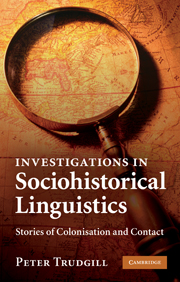Book contents
- Frontmatter
- Contents
- List of maps
- List of tables
- Acknowledgements
- Prologue: Colonisation and contact
- 1 What really happened to Old English?
- 2 East Anglian English and the Spanish Inquisition
- 3 On Anguilla and The Pickwick Papers
- 4 The last Yankee in the Pacific
- 5 An American lack of dynamism
- 6 Colonial lag?
- 7 “The new non-rhotic style”
- 8 What became of all the Scots?
- Epilogue: The critical threshold and interactional synchrony
- Bibliography
- Index
8 - What became of all the Scots?
Published online by Cambridge University Press: 02 December 2010
- Frontmatter
- Contents
- List of maps
- List of tables
- Acknowledgements
- Prologue: Colonisation and contact
- 1 What really happened to Old English?
- 2 East Anglian English and the Spanish Inquisition
- 3 On Anguilla and The Pickwick Papers
- 4 The last Yankee in the Pacific
- 5 An American lack of dynamism
- 6 Colonial lag?
- 7 “The new non-rhotic style”
- 8 What became of all the Scots?
- Epilogue: The critical threshold and interactional synchrony
- Bibliography
- Index
Summary
In Chapters 6 and 7 we discussed the work of the Origins of New Zealand English project. This research showed that this newest of all of the major native-speaker varieties of English was the result in part of drift, but crucially also of dialect contact and new-dialect formation. Clearly, the dialects which were involved in the initial colonial dialect-contact situation were varieties of English which had been brought to New Zealand from England, Scotland, Wales and Ireland.
These different parts of the British Isles, however, were not evenly represented. In terms of population figures, the Englishes that came into contact in New Zealand (and on the boat during the long trip out) arrived from England, Scotland and Ireland in roughly the proportion 5:2:2. The north of England was underrepresented, and the Welsh contribution was very low (McKinnon 1997). These proportions tally rather well with Bauer's lexical study (Bauer 2000), which shows that there are focal points for the dialectal origins of New Zealand lexis “in Scotland, in Ireland, and in a band stretching from Lincolnshire … through Nottinghamshire, Warwickshire and Somerset to Devon and Cornwall” (Bauer 2000: 52).
In considering the relative importance of the different forms of British Isles English involved in the dialect mixture which gave rise to modern New Zealand English, no one will doubt the significance of the input from England, on linguistic grounds alone.
- Type
- Chapter
- Information
- Investigations in Sociohistorical LinguisticsStories of Colonisation and Contact, pp. 159 - 180Publisher: Cambridge University PressPrint publication year: 2010

